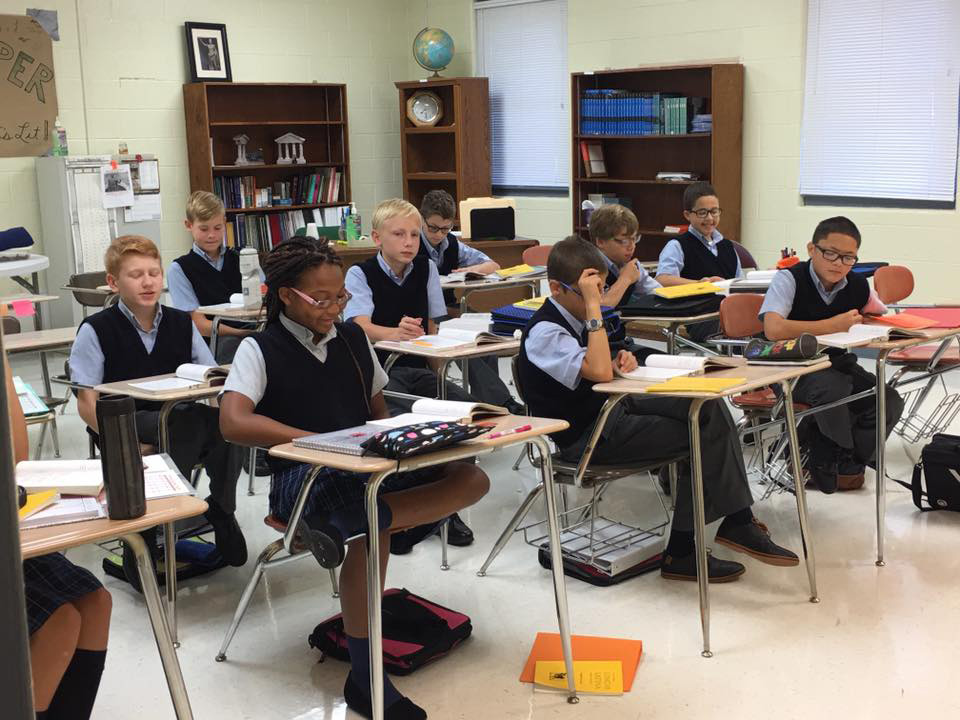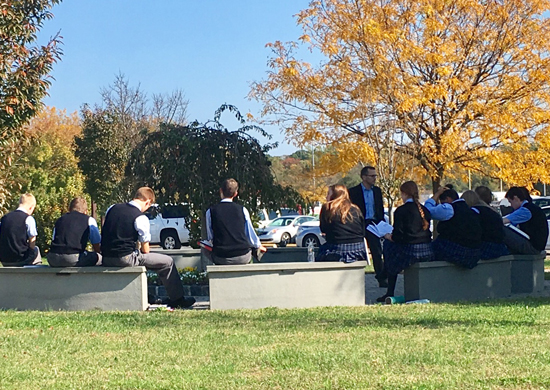Logic School (6th-8th)
 When the grammar of a subject is learned, we can go on to the Logic School, in which we apply reason to the facts we have learned in order to see inter-relationships, understand cause and effect, and analyze arguments. Although we teach logical thinking and analytical reasoning at all ages, we emphasize these skills and teach formal logic and debate in the Logic School. We teach our students to construct good arguments and to detect fallacious ones. We seek to develop in our students a biblical worldview consistent with the truth that God reveals. Whether the subject being taught is mathematics, science, literature, geography or the arts, we help our students develop an integrated understanding of God and His creation.
When the grammar of a subject is learned, we can go on to the Logic School, in which we apply reason to the facts we have learned in order to see inter-relationships, understand cause and effect, and analyze arguments. Although we teach logical thinking and analytical reasoning at all ages, we emphasize these skills and teach formal logic and debate in the Logic School. We teach our students to construct good arguments and to detect fallacious ones. We seek to develop in our students a biblical worldview consistent with the truth that God reveals. Whether the subject being taught is mathematics, science, literature, geography or the arts, we help our students develop an integrated understanding of God and His creation.
6th Grade
Saxon Math Course 2
Bible Survey Acts to Revelation
Science – Unit studies in Biology, Earth Science, Chemistry, and Physics
Literature-based Reading Program
Vocabulary – Vocabulary from Classical Roots
English – Shurley Grammar 7
Composition – Progymnasmata (Chreia/Maxim)
History – 1812 to Present
Geography – World Geography
Latin - Lingua Latina
Art, Physical Education, and Grammar of Music (Hand chimes)
Scripture and Catechism Memory Program
7th Grade
Composition and Grammar – Our Mother Tongue and English Grammar Composition: Second Course
General Science – Exploring Creation with General Science and God’s Design for Heaven and Earth
Latin I – Lingua Latina
Literature – Little Women; Mere Christianity; Number the Stars; Sing Down the Moon; Sir Gibbie; The Hobbit; The Holiness of God; The Pilgrim’s Progress; The Prince and the Pauper and The Story of Siegfried
Pre-Algebra – Elementary Algebra
History of Apologetics
Art
Music
Drama
Physical Education
8th Grade
Algebra I – Elementary Algebra
Latin II – Lingua Latina
Logic – Introductory Logic for Christian & Home Schools and Intermediate Logic for Christian & Home Schools
Classical Literature & Composition I –
- The Screwtape Letters by C.S. Lewis (summer reading assignment)
- Gilgamesh
- The Iliad by Homer
- The Odyssey by Homer
- Theogony and Works and Days by Hesiod
- Agamemnon by Aeschylus
- Oedipus Rex and Antigone by Sophocles
- Medea by Euripides
- Myths of Greece and Rome by H.A. Guerber (excerpts)
Old Testament Biblical Theology –The Holy Bible, English Standard Version (excerpts) and A House for My Name by Peter Leithart
Western Civilization I –
- Histories, Herodotus.
- History of the Peloponnesian War, Thucydides.
- The Life of Alexander the Great, Plutarch.
- The Early History of Rome, Livy.
- The History of the Church, Eusebius.
- In Praise of Constantine, Eusebius
- City of God, Augustine
- Theaetetus, Plato
- The Republic, Plato
- Gorgias, Plato
- Nicomachean Ethics, Aristotle
- Meditations, Marcus Aurelius
- The Didache
- First Apology, Justin Martyr
- On First Principles (Book IV), Origen
- The Seven Ecumenical Councils, Philip Schaff (ed)
Art
Music
Physical Education
Rhetoric School (9th-12th)
 The capstone of a classical education is reached in the high school years when our students learn the rhetorical skills that allow them to master a subject and communicate it to others. They learn to conduct research, form their own conclusions, and effectively and persuasively communicate their understanding.
The capstone of a classical education is reached in the high school years when our students learn the rhetorical skills that allow them to master a subject and communicate it to others. They learn to conduct research, form their own conclusions, and effectively and persuasively communicate their understanding.
The leaders of every field have reached this level of learning, which we call the Rhetoric School. By the time our students reach high school, they are developmentally ready to begin formal training in rhetoric, and to practice applying that training in all their subjects. We give them opportunities to hone their rhetorical skills through written work, including major theses in their junior and senior years, as well as oral presentations. They learn to defend their faith humbly and intelligently. They develop the confidence and skills they need to succeed in higher education or to tackle any subject they want or need to learn. Tall Oaks students are equipped to be lifetime learners and leaders.
9th Grade
Argumentation and Debate – The Debater’s Guide
Physical Science - Accelerated Studies in Physics and Chemistry
Classical Literature & Composition II –
- The Chosen by Chaim Potok (summer reading assignment)
- Euthyphro and Apology by Plato
- The Aeneid by Virgil
- Metamorphoses by Ovid (excerpts)
- Confessions by St. Augustine
- Beowulf
- Inferno by Dante*
Geometry – Seeing, Doing, Understanding
Latin III – Wheelock
Spanish I – Avancemos 1
Western Civilization II –
- Short History of Byzantium, John Norwich
- The Life of Alfred the Great, Asser
- Enneads, Plotinus
- Rule of Saint Benedict
- Morals on the Book of Job, Gregory the Great
- Annals of Xanten
- Procopius: Secret History
- Tarik's Address to His Soldiers
- History of the Patriarch's of Alexandria
- Battle of Tours, Descriptions
- Einhard's Life of Charlemagne
- Concerning the Origin of Guilds
- Orations, Themistius
- The Divine Names, Dionysius
- The Mystical Theology, Dionysius
- The Seven Ecumenical Councils, Philip Schaff (ed)
- Timothy's Apology for Christianity, Patriarch Timothy I
- The Primary Chronicle
- Abelard: Sic et Non (Yes and No)
- John of Salisbury: The Metalogicon
- Thomas Aquinas: Summa Theologica
- Dictates Papae (Dictates of the Pope)
- Urban II: Speech at Clermont
- Fulk of Chartes: The Capture of Jerusaelm
- William of Malmesbury, The Battle of Hastings
- Magna Charta
- Ordinance of Laborers, 1349
- Joan of Arc: Twelve Articles of Accusation
- Petrarch: The Ascent of Mount Ventoux
- Lorenzo de Medici: Paternal Advice to a Cardinal
- Pico: Oration on the Dignity of Man
- Thomas á Kempis: Imitation of Christ (1427)
- Erasmus: In Praise of Folly (1520)
- Martin Luther: Ninety-Five Theses (1517)
- Martin Luther: "On Christian Freedom" (1520)
- The 12 Articles of the German Peasants (1524)
- John Calvin: Institutes of the Christian Religion
- Selected Works of Huldrich Zwingli
- The Religious Peace of Augsburg (1555)
- Westminster Confession
- James I on the Divine Right of Kings (1609)
- Thomas Hobbes: Leviathan (1651)
- John Locke: Essay Concerning Human Understanding
- John Locke: Two Treatises of Government
- Isaac Newton, Principia (1687)
- Descartes: Meditations
- Enquiry, Hume
- “Assayer,” Galileo
- New Organon, Bacon
New Testament Biblical Theology – Holy Bible and A House for My Name
Physical Education
Art
Music
10th Grade
Algebra II – Algebra and Trigonometry
American Literature – The Norton Anthology of American Literature; The Scarlet Letter; The Adventures of Huckleberry Finn; The Great Gatsby and My Antonia
Biology and Lab - Exploring Creation with Biology College Prep
Spanish II – Avancemos 2
Systematic Theology – Christian Theology: An Introduction; On the Incarnation and Confessions
U.S. History –
- Narrative of the Life of Frederick Douglass: An American Slave, Frederick Douglass (entire).
- A Documentary History of the United States edited by Richard Heffner (excerpts)
- "Reflections on the Revolution in France," Burke
- Various letters from Adams, Franklin, Jefferson, Madison, and Washington
- The Jeffersonian Bible
- The Northwest Ordinance
- The Treaty of Tripoli
- "Memorial and Remonstrance"
- Lectures on Laws. James Wilson.
Personal Finance
Art
Music
Physical Education
11th Grade
Aesthetics – Beauty for Truth’s Sake: On the Re-enchantment of Education; Music and Morals: A Theological Appraisal of the Moral and Psychological Effects of Music; The Fragrance of God; Symposium; Modern Art and the Death of Culture.
British Literature – Sir Gawain and the Green Knight; Life of Samuel Johnson; 1984; Great Expectations and The Faerie Queene
Chemistry and Lab – The Spectrum Chemistry
Hermeneutics and Spiritual Disciplines – Spiritual Disciplines for the Christian Life
Precalculus – Algebra and Trigonometry and Precalculus with Limits
Civics –
- The Republic, Plato
- The Politics, Aristotle
- In Praise of Constantine, Eusebius
- City of God, Augustine
- Homilies on the Statues, John Chrysostom
- "On Secular Authority," Martin Luther
- Institutes of the Christian Religion, John Calvin
- The Federalist Papers
- Theology and Social Theory, John Milbank
Rhetoric I – Ancient Rhetorics for Contemporary Students and Rhetorica ad Herennium
Spanish III / IV - Interacciones
Leadership
Art
College Prep
Music
12th Grade
Advanced Literature –
- Crime and Punishment by Fyodor Dostoevsky (summer reading assignment)
- The Brothers Karamazov by Fyodor Dostoevsky (excerpts)
- Eugene Onegin and “The Queen of Spades” by Alexander Pushkin
- “The Nose” and “The Overcoat” by Nikolai Gogol
- The Death of Ivan Ilych by Leo Tolstoy
- One Day in the Life of Ivan Denisovich by Alexander Solzhenitsyn
- Hamlet and The Tempest by William Shakespeare
- Inferno by Dante*
- Everything that Rises Must Converge (selections from the collection of short stories) by Flannery O’Connor**
- Till We Have Faces by C.S. Lewis
- Brave New World by Aldous Huxley
- The World’s Greatest Short Stories (selections from the anthology), Ed. James Daley
- Literature: A Student’s Guide by Louis Markos
Apologetics – City of God; Orthodoxy; Atheist Delusions: The Christian Revolution and Its Fashionable Enemies and The Abolition of Man
Calculus – Calculus of a Single Variable
Greek - William Mounce's Basics of Biblical Greek
College Prep
Economics –
- Foundations of Economics: A Christian View, Shawn Ritenour.
- Economics in One Lesson, Henry Hazlitt.
- The Literary Book of Economics, Michael Watts, ed.
- Usury in Christendom: The Mortal Sin that Was and Now is Not, Hoffman
Leadership
Physics and Lab – Physics: Principles and Problems
Rhetoric II – The Rhetoric Companion
Art
Music
Electives:
Various Computer Electives
Vocal Ensemble
Yearbook
Debate Team
Art
Scripture and Catechism Memory Program
